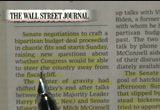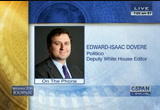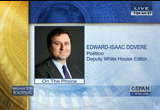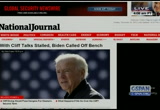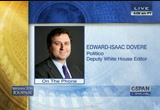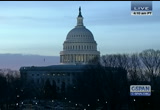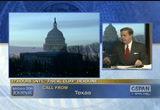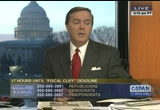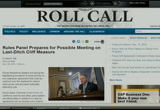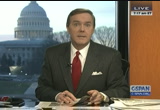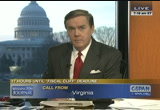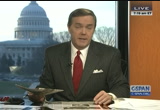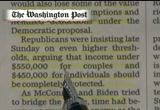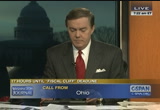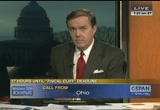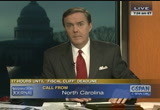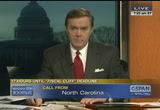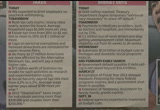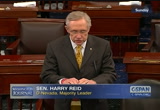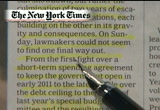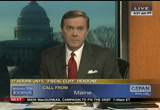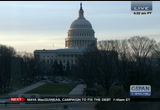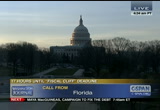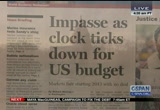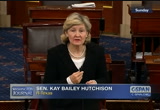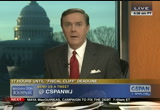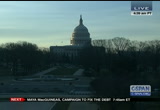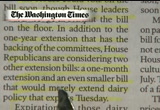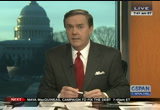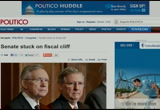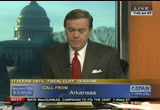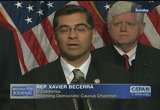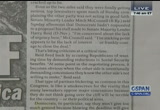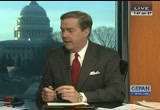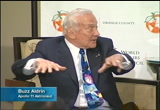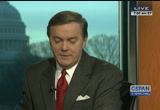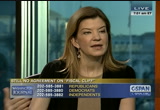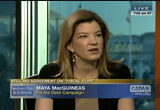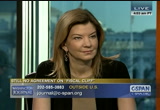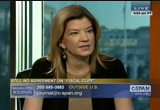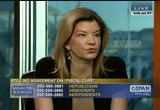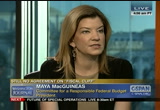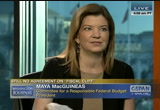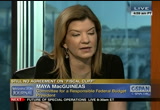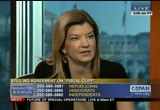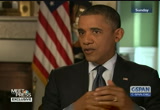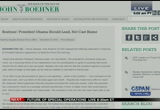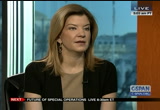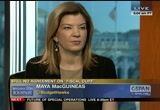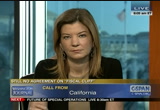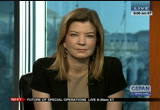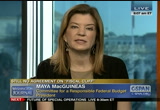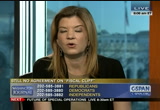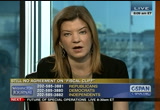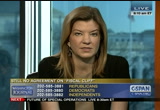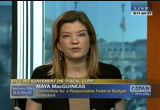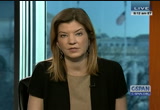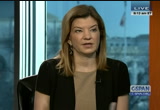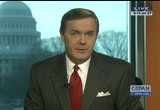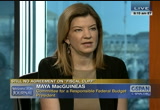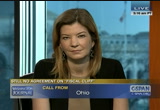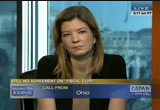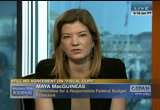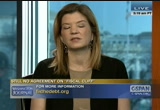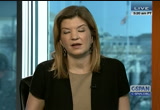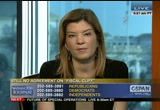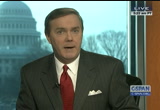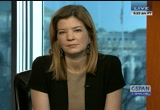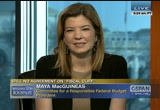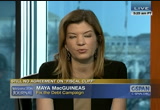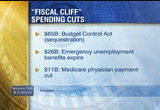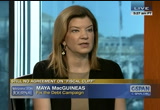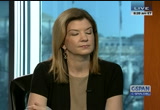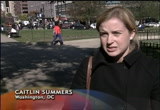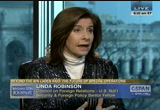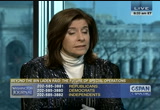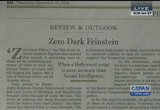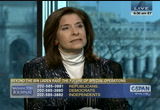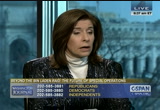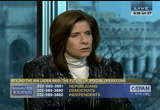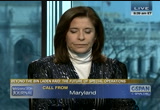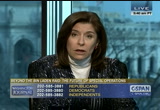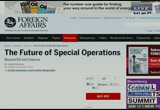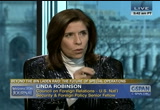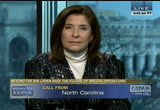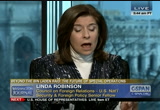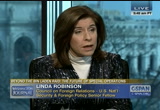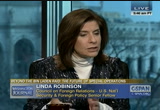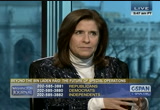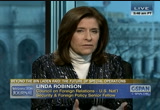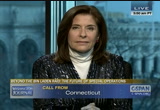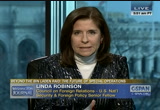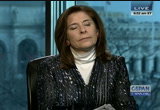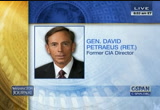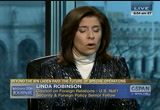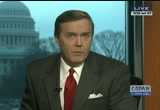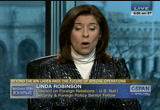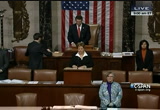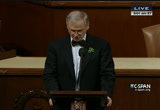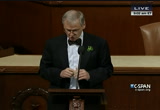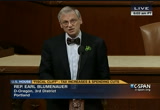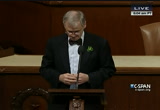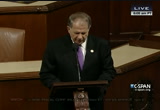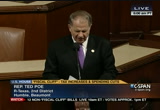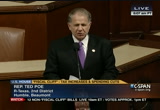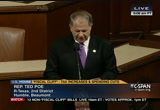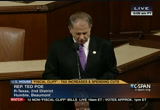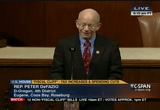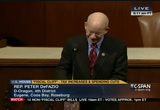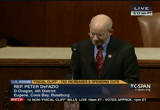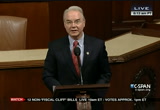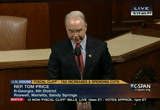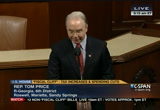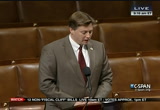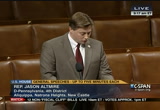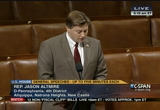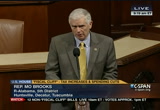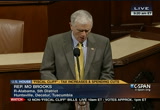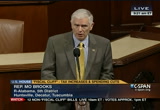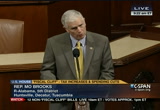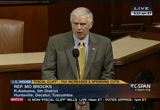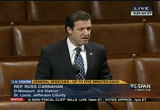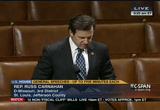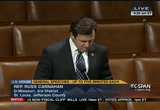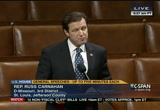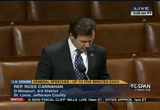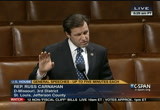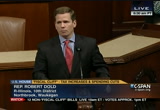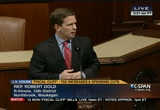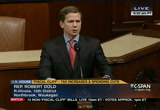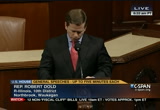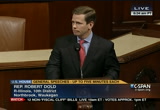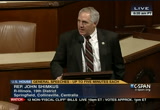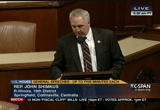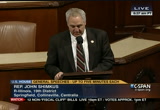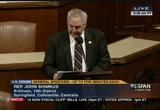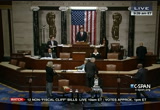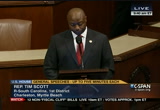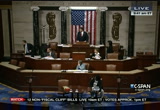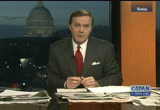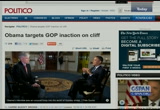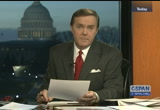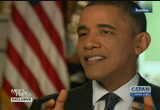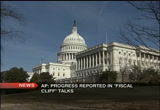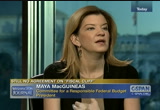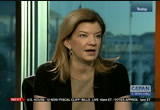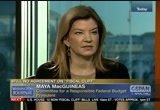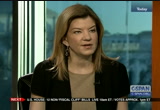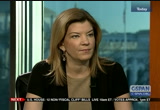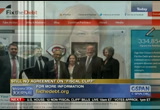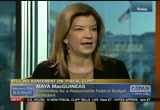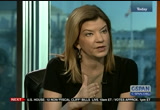tv Washington Journal CSPAN December 31, 2012 7:00am-10:00am EST
7:00 am
7:01 am
the first time since 1970, congress is meeting between the christmas and new year's holiday. preparations are underway as lawmakers -- if lawmakers fail to act. we are 17 hours until the deadline. midnight is the deadline east coast time. here are the numbers. host: also, send us an e-mail and jonas on facebook, -- join us on facebook or you can send us a tweet. let's take a scan of the headlines and we begin with "the
7:02 am
7:03 am
host: a lot of activity on the house and senate chamber. we will be falling all of that on the c-span networks. we have the deputy white house editor from politico. tell us where we stand. guest: we stand in limbo, is the best way to put it. the senate was hoping they could be the ones to reach a deal over the weekend and they could not and that has left things in the
7:04 am
house still waiting for the senate to move with the house acting yesterday. they did a procedural change so they could vote quickly on a senate deal if there is a senate deal. it doesn't look like we're likely headed to one at this time. host: that leads to lay blame game and this headline from " politico." "the republicans have had trouble saying yes." what has been going on here? wanted to president's raise taxes for people making over $250,000 a year and do
7:05 am
that with some budget cuts and some and tom reform and that he has not been able to get any kind of action from the republicans. he believes there is a negotiation in which he has been the only person willing to put forward any kind of compromise and the house republicans have not been able or willing to do. the vote john boehner schedule and had to cancel is evidence of that in the present cost mind -- in the president's mind. we have part of what speaker boehner said. "the comments today are ironic as a recurrent theme was
7:06 am
his unwillingness to stand up to anything in his own party. from the republican side of the aisle and speaker boehner, where are things at the moment? guest: the speaker had been hoping there would be a larger deal. the president was ready to move forward on in the time they had in front of them. this was in vision at one point to be the grand bargain which would incorporate in atomic reform and all sorts of budget cuts. changes to the tax rates. unemployment benefit changes. going all the way through to the debt ceiling being raised as part of it as well.
7:07 am
that was not something that was ever really where things were headed by the time the negotiations got started. for speaker boehner, he wants to see the spending cuts that would go along with them. he does not feel the president has put forward enough of a plan to where the spending would be cut to compensate for the taxes that would stay down or that would be raised. host: the president's appearing on "meet the press" was an unusual foray. here's more from the president. [video clip] >> the offers i have made to them have been so there that a lot of democrats get mad at me.
7:08 am
i offered to make some significant changes to our entitlement programs to reduce the deficit. one trillion dollars in spending cuts over the next 10 years but these changes would result in more savings in the next 10 years and would solve our deficit problems for a decade. they say their biggest priority is dealing with the deficit. they are behaving and protecting the tax breaks for the wealthiest americans. that seems to be their overriding theme. host: a new development yesterday, the vice president joe biden was called in by mitch mcconnell, who said he needed a dance partner in all of this.
7:09 am
guest: if you remember on friday, the president said he was going to turn over the lead to senator reid and senator mcconnell to work out a deal that could pass the senate and that he would sign on to whatever deal that was. senator reid and senator mcconnell were not able to reach that deal. the negotiations between them have turned increasingly bitter and senator mcconnell basically said that he could not work with senator read anymore and reached out to joe biden and ask him to resume the role that he has had in previous negotiations. the arbiter, the deal maker. joe biden had not been as involved atoll has returned to
7:10 am
washington and is now part of the negotiations in a way that he had not been expected to until yesterday. host: what will the house and senate be voting on today? will there be an agreement on the fiscal cliff or an alternative plan that would continue unemployment benefits and keep taxes at the bush era level? guest: i'm not sure that anybody knows. and that includes president obama, joe biden, senator reid, speaker boehner. there are not the many hours left until the new year. the players involved are all aware of that. that has not made enough of a difference to change the
7:11 am
negotiations. we will know more as the house and senate members return to the hill this morning. then we will know if we're going over the fiscal cliff at midnight. host: edward-isaac dovere, thank you for being with us. guest: thank you. host: the senate action getting underway about 11:00 a.m. and we will have live coverage of what happens on each floor of the chamber as lawmakers will meet with reporters. this is from joseph ramirez. "the blame game continues" is the headline from "usa today."
7:12 am
charles is joining us from texas. caller: good morning. thank you for taking my call. i think we are in trouble either way. president obama was known to be the most extravagant senator when he was in office and never had a job as far as i know of. it seems like he has a bottomless bank account. given money away like in new york and new jersey. $60 billion or $80 billion. don't they have insurance of the up there? host: thank you for the call.
7:13 am
is this from bill king. this is bob, good morning. caller: happy new year. host: to you, too. caller: all the republican party has to do is to allow for what the voters voted on by putting obama back in office, which was the mandate that people earning above $250,000 pay 4.5%.eer lousy that is not a hair off their chinny-chin-chin. everybody is looking to fight against the tax increase for the wealthiest people.
7:14 am
they take a ski vacation in france and a cost $20,000. they spend money like it is garbage. cheerleading for tax breaks for people who do not need it. they have admitted they do not need it. the republicans and the democrats are not facing the key issue with our budget, which is medical cost. it is insanity we do not hear enough and i wish c-span would have more programs dealing with all of the options that could lessen the burden on the government and the taxpayer for the medical costs. i believe that in medicare buy-
7:15 am
in -- i have 10 years left to go until medicare. i pay $620 a month for my health care. that is a lot of money. i would give that to the government and would usn't use t $100 or $200 a year. host: that is an important issue. we will focus more as the affordable care act t kicks in. for the suggestion -- thank you
7:16 am
for the suggestion. the deficit is close to $16.4 trillion. this is part of the debate we will see at the start of the new congress. the so-called fiscal cliff was coined by ben bernanke. the story from "roll call." "it could be reached over this weekend." were heard from the house rules committee chairman yesterday. they are taking steps in advance to extend these tax cuts. a deal could be on the floor today if there is an agreement. from "the washington times" this
7:17 am
7:18 am
we voters know this country has a lot of issues going forward. if they can take a bite out of these difficult issues one at a time, how will they make sure this country is put on a better footing? this is item number one in a list of hundredsd. -- in a list of hundreds. they are not willing to raise any taxes. just rolling back some of the bush-era tax cuts. when you're having issues, you have to make tough choices. host: thank you for the call.
7:19 am
the damage may be done. some of the comments yesterday. [video clip] >> we remain hopeful that there will be a breakthrough. what happened between the leaders in the senate had broken down because there was not a counter offer to the republic proposal that was made last night. host: this is the headline from "the washington post." mitch mcconnell and joe biden in talks.
7:20 am
7:21 am
host: that from inside "the washington post." ed is on the phone from michigan. good morning to you. caller: good morning, c-span. i have listened to some of what the democrats have said. the way i look at it -- if the rich, if they are worried about 3% raise, one of the middle class and the poor or about the same raise? is it your patriotic duty to pay taxes? if the poor are concerned
7:22 am
about their money going down, a lot of energy regulations are coming into effect that will cost electric costs to co-op which will affect the poor just as badly as it is the rich? host: mark from ohio, good morning. caller: all the power was taken from the epa and given to the nra. there is no fiscal cliff. there was another so-called fiscal cliff in 2008. give money to the billionaires and banks. when eisenhower took office, he gutted the military.
7:23 am
taxes were 9% on corporations. 10 trillion dollars being horded. the problem lies and propaganda. 90% of all our information from the tv and the radio comes out of the state of texas and new york city. that is wall street. there is an economy based on military bases and nafta and oil. that is clear channel radio. time warner comes out georgia. up on the east coast, new york
7:24 am
city is for the bankers are and insurance companies and derivatives and the jews that run the media. host: i will stop you on that point. this is from jan. some of you sharing your thoughts on our facebook page as well. one person writes -- host: join us honor twitter page or on our facebook page. rick from charlotte, north carolina. caller: good morning, america and steve. this is a great time to be an american. i think we are all looking forward to the new year.
7:25 am
i am a loyal but nervous. -- i am a little bit nervous. mitch mcconnell is the key. he can take the president over into the presidency and a came a great man. we need to make sure we let mr. mcconnell know that history is there. i know he has a lot of issues. everyone bacchant e-mail, text -- everyone can e-mail and text and let mr. mcconnell n know. the tea party is off the rail. this will make this country take off. i hope mr. mcconnell sees this.
7:26 am
everyone out there, the game has been played. host: thank you for the call. harry is joining us from pittsburgh. caller: this whole thing is ridiculous. i started paying social security and 14. i have quite a bit of money in there. i have made my own way. record, the past money they are asking for, that is mostly white people making that money. they should call it what it is. that is still whitey's money.
7:27 am
i wish i was as smart as it then people. a lot of people have called then and have not worked hard. everybody wants their children to be rich. right now you're evil if you're rich. host: thank you for the call, harry. this is from "the new york post." tomorrow the bush tax cuts expire. the state tax is rising to 55% on $1 million or more. the alternative minimum tax and people will pay a higher rate.
7:28 am
7:29 am
that is something the new congress will have to deal with. less than 17 hours before the deadline. ellen is joining us from washington, d.c. caller: good morning. i did nothing speaker boehner wanted to cut a deal with the democrats anyway. all this stuff is around president bush. it's not all on obama. host: ok. thank you for the call. harry reid said this yesterday. [video clip] >> the republicans have taken the benefit cuts off the table. there is still significant distance between the two sides
7:30 am
7:31 am
host: that is the front page of "the new york times." good morning from maine. caller: good morning. thank you for taking my call. we have been corralled into involuntary servitude. this has been our history. i do not want to support a military and industrial complex that wants to sell arms globally. i do not want to support life- ending measures. this is where we of fallen into a trap. they may want to close a door on
7:32 am
us. tomorrow is the 150th anniversary of the emancipation proclamation. host: thank you for the call. george monroe has this -- much of the activity on the hill is happening behind closed doors. this is from "the washington post." "the talks drag on in a divided congress." next up from louisiana. are you with us? good morning. caller: i have been a registered republican for more than 40 years. i will not vote for republicans
7:33 am
because they have changed so much. i believe the republican party is now controlled by a few wealthy people at the top and everybody who is elected has to use the same talking points and vote the way they are told to vote rather than allow republicans to use their own brain. the best thing for america to do is to throw the republicans out and demand the democrats govern the way the country should. thank you for the opportunity to speak on c-span. host: thank you for the call. this is from our twitter page. we are about to reach the debt limit. let's go back to the cnbc website.
7:34 am
"hours from the fiscal cliff, washington awaits deal." experts foresee a significant drag on the economy. negotiators keeping the bush-era tax cuts in place for all but the wealthiest americans. this is having a huge impact on what the markets want, which is some certainty. good morning, andy. caller: i was a volunteer rescue worker at the world trade center. i have two cancers. these guys want to mess with social security. there was a guy on yesterday. he was willing to pay a little
7:35 am
more. he will still have over $200,000 left. he'll have maybe $20,000 last. it is ridiculous. we of the strong people. we are the ones that survive. they call us the little people. we are the strong people. host: it is 7:35 eastern time. the house will gavel and at 9:00 p.m. eastern time. we will have live coverage. the senate is coming in at 11:00 a.m. more from the senate floor yesterday. [video clip]
7:36 am
>> i'm sure if president does not want a climate like this happen. i do not want on my watch for this to be the last thing that happens on my watch. i do not think anyone here will benefit from a calamity happening in this country's economy, even for a few days. it just looks like we cannot govern and it is time to realize that on a bipartisan basis, we can do some things that will not be universally liked 100%, because we are not going to get everything we think is right. but we can move our country forward and we can help everyone in this country, every
7:37 am
taxpayer. we are not going to raise taxes to spend more. should be saying, if there is going to be a threshold that pays more taxes, it will bring down the deficits. that is an important point that we hope will be determined at the end of this road, in 36 to 48 hours. host: we are getting your calls and comments. maya macguineas will be joining us and what this means for you. this headline -- "i'm sick of it. falloff cliff."
7:38 am
this is from foxnews.com. "those elected still appeared to wield considerable power in the negotiations. the 50 members have challenged john boehner since they took office. the of them refusing to support a debt ceiling bill because it did not reduce spending enough." joe has this on our twitter page. host: andy is joining us from florida. good morning. you are on the air. we will try one more time.
7:39 am
we will go to bonnie. caller: good morning. it is always the republicans. the democrats pushed in a deal on obamacare. they just give themselves a $900 a year raise. entitlements that obama thinks -- he is spending $5 million of taxpayer money for a vacation. everybody is going to have to pay more taxes. why? what are the entitlements going to the politicians? they get a six-figure salary and everything is paid for. you try to get into the white house or one of the senator's
7:40 am
7:41 am
hillary clinton, -- more on hillary clinton who remains hospitalized this morning after it blood clot had formed. the clot stems from a concussion she sustained several weeks ago. she is in new york president obama -- new york presbyterian hospital. her doctors will continue to assess her condition and will determine if any further action is required. she has not been seen in public in three weeks. was supposed to come back to office this week. next is ron from cincinnati, good morning. caller: i wish mrs. clinton
7:42 am
well. they take social security and want to privatize it. they took the money out and that is a debt that we owe to ourselves. you buy their cars and trucks. whatever you buy from them -- it would transfer the overhead. they complain about 4% of the taxes. host: thank you for the call. this is from politico. uck.senate appears stoc charles is joining us from arkansas. caller: good morning. you wanted and got something
7:43 am
from nothing. you voted for these people. you better look to your children and grandchildren and apologize. for every dollar that you get from the government, your 46 centsare in bdegt -- you are in debt 46 cents. look down and apologize to your children. that stands for everybody. the adjustment talk about social security. -- the gentlemen talked about social security. that came out of the general fund by president johnson. he did that just to get a vote. these people are going to give
7:44 am
it to him. thank you for your time. host: thank you and happy new year. this from mitch mcconnell s.c. met with staffers -- as he met with staffers. aides making plans to press the democratic proposals after the fiscal cliff deadline is breached. host: from our twitter page there is this. another comment is the democrat from california.
7:45 am
[video clip] >> none of the votes will be casting have anything to do with the votes will cast in some of the more than 24 hours. we believe there is a bill that would help address some of these deadlines. the senate passed the bill that would protect middle class families from any tax increase. one way or another we should get something done. i know my colleagues have heard what i've heard. i have heard it from constituents back home -- "just get it done." we have a little more than 24 hours. the men i get all their republican colleagues to vote for them.
7:46 am
host: one of the many news conferences that took place yesterday. the house and senate will begin today. the house met twice during world war ii between christmas and new year's. the last time was back in 1970 's. this comes from our twitter page. and there is this from "the new york daily news." there is a sidebar story about no urgency to cut a deal. let me read a little bit.
7:47 am
host: rick is joining us from colorado. good morning. caller: they cannot come to an agreement. i would like to see they lose their pay and benefits. in the private sector, these people are on strike. you don't get paid during a strike. i think it should be the same thing. they knew this line was coming. host: rick, thank you for the call. that is in regard to social security benefits.
7:48 am
live coverage of the house at 9:00 a.m. we will continue our conversation on the fiscal cliff. maya macguineas is going to be with us. later we will turn our attention to a new movie on the raid that killed osama bin laden and talking with linda robinson who is an author as "washington journal" continues. it is monday, december 31. .e'll be back in just a moment [video clip]
7:49 am
>> as president obama begins his second term in office, what is the most important issue he should consider for 2013? >> so tell us. if you're in grade sixth through 12, make a short video about your message to the president. >> it's c-span's student cam video competition with your chance to win the grand prize of $5,000. and there is $50,000 in total prizes. the deadline is january 18. for more information, go to studentcam.org. >> a lot of people will say that ever since the apollo, the space program has been a jobs program. how many jobs can we get in your district, in your state? the space shuttle passed by one vote because it was passed all around the country. we had people working different places. i can tell you some pretty brutal stories about the politics that get involved in
7:50 am
our space program. it is bring home the bacon and the bacon is jobs because jobs get votes and votes keep a congressman or senator in office. >> buzz aldrin on the past and future of space exploration. polling in the 2012 election. >> "washington journal" continues. host: maya macguineas is heading up the fix the debt campaign. welcome back. this says it all. "it looks awful." guest: i think we all feel
7:51 am
that. it is not as though we did know the fiscal cliff was coming. there are huge challenges facing the country. if we go over the fiscal cliff, the risk to the economy is strong. there is it to families is real. it is as if politicians are playing tug of war. as soon as we get through the fiscal cliff -- the hope is we would replace the fiscal cliff with real policies that would keep us from going over it. now looks as though we're not going to be able to do anything to tackle the challenges right now. the partisan environment is getting worse and worse.
7:52 am
that leaves us with questions about whether these guys can govern. host: front page of "the new york times." let me read a few points. "more difficult to reach a compromise." guest: that is absolutely true. i feel we're watching a game of finger-pointing and not much else. both sides are pointing fingers and shouting it is the other guy's fault. what if any other business environment worked this way instead of solving the problems and working together?
7:53 am
the toxic environment calls into question when we of challenges or other important issues -- can the american political system step up and deal with sit? the answer is not very well. we feel saddened and disappointed by our ability to rise to the challenge of fixing the problems. host: some of that is aimed at you. you come up in this column as does howard schultz, the ceo of starbucks. people were asked to write "come together" on cups at starbucks. guest: people say we should talk
7:54 am
about why it's the other side's fault and i disagree. there are as many points of view to how to fix the problems as people in congress. some of them denied it is a problem we have to fix. we have to do with getting jobs back and we have to do with bringing our deficit down. people are not going to be able to implement their favorite approach and that is one the real work can begin. i tire of the washington environment where people are saying, it is his faults. they are here to do the job of fixing the country. that means they have to come together.
7:55 am
as long as there is a partisan environment, we are not getting to the real work of solving problems. host: paul krugman goes back to say -- guest: i think it is a remarkable campaign that has sprung up in the past couple months and is trying to bring together people with the first backgrounds and perspectives to change the way things get done in washington.
7:56 am
they want a big debt deal that is big enough to fix the problem. it does it mean balancing the budget. fiscal hole is so deep. the deal they have been talking about right now falls far short of this kind of an objective. what we're hearing would make the deficit worse. that means the fiscal cliff will not be the moment we fix the problem. the campaign to fix the debt says we need to look at how you raise revenues. that means broadening the tax base. if you get rid of the tax
7:57 am
breaks, you could bring the rates down while raising revenue. you can do it by reforming the tax code in a way that would be better for the economy. right now rates are going to go off. there is still room because we will not raise enough revenue. we make the case you have to cut spending and reform entitlements looking at the health-care programs and retirement programs, to are under real stress -- which are under real stress. any plan has to look at all parts of the budget. the fiscal cliff is an across-
7:58 am
the-board whack and that would put us back into recession. we can protect people that depend on these programs and so that we do raise significant revenues. we believe any plan has to be a bipartisan. it is about the country. it's interesting is how many people have stepped forward and saying to congress, stop making the situation worse. if you make the hard choices, the campaign to fix the debt will be there. a group of people are saying we support you in making hard choices. so far, we do not see that fix
7:59 am
in place. there is real risk to the economy if we wait too long. host: you spend some time on wall street. the market was down on friday. could it happened this week? guest: anything could happen this week. the markets don't know what to make about what is going on on capitol hill. we do not know what kind of deal is going to come out of this. it seems impossible the deal will be big enough to help deal with the fiscal challenges going forward. we will not have any of the stability in the economy and knowing what we will see around
8:00 am
the corner. that uncertainty is bad for markets. we do not know what the markets have priced in. nobody knows if congress would come back and fix the problem with this would drag for a long time. when you see movements in the markets they may happen very swiftly and abruptly. the point that would make about this is why is it the people we hired to run the country are getting to the brink where we are waiting with bated breath to see if the markets are going to suddenly lose faith in this country or if we will get downgraded? we have let it go so long when we have known this problem was out there for so long. i hear people saying there's not enough time to fix the problem
8:01 am
now. this is not something that came as a surprise to us. the fiscal cliff was put in place by members of congress through the super committee and there were not able to come up with a big budget deal to fix the problems, they said if we cannot come up with a deal, if we will have these automatic cuts police. they knew the tax cuts were expiring. there are no surprises here is there's only an inability of people to work together and make hard choices that must be made. host: as the story unfolded over the past 24 hours, the president weighing in on all this and the blame game back and forth between democrats and republicans. years when he said on nbc. [video clip] >> we have been talking to the republicans ever since the election was over. they have had trouble saying yes to a number of repeated offers. yesterday i had another meeting with the leadership. i suggested to them if they cannot do a comprehensive package of smart deficit reductions, let's at minimum make sure that people's taxes don't go up and that 2 million
8:02 am
people lose their unemployment insurance. i was modestly optimistic yesterday, but we don't yet see an agreement. now the pressure's on congress to produce. if they don't, what i have said is that in the senate, we should go ahead and introduce legislation that would make sure middle-class taxes stay where they are and there should be an up-or-down vote. everybody should have a right to vote on that. if republicans don't like it, they can vote no. host: the president yesterday speaking. that led to a response from the speaker of the house john boehner. he issued a statement that included these words -- he says the president is the one who has never been able to get a yes.
8:03 am
house passed legislation to avert the entire fiscal cliff canada and the president has never called for the senate to act on those skills in any way." it's part of a six-paragraph statement from the speaker of the house yesterday afternoon. guest: it's a lot of back-and- forth. it's a lot of finger-pointing. they should all be in the room. they should be working on this until it gets done. every member of congress should feel an obligation to be putting forth solutions. it seems to me that there are far more focus on the political gains or downside of various deals than there is the true effect this as on the country. host: even if they were in the room with all the principles and the five or six principles agreed to plan, could pass the republican house of the democratic senate? guest: it depends what is in the plan. so far what we've seen is plans that are getting smaller and smaller. they are saying we cannot do this and things are getting taken off the table. one of the things we have seen
8:04 am
in different approaches to this in the past, the simpson-bowles commission, where this was about two years ago, it ended up being supported by a majority of bipartisan members who serve on the simpson-bowles commission. one of the things they found when they were struggling with this was the more things they're willing to put on the table, the more members will want to support something. if you actually put in place an overall deal that made progress at fixing the problem, and i think you would find a lot more support. instead, we are negotiating to the smallest level and you see people being unwilling to support it. the process is tricky. a number of people in the house really don't want to raise taxes. what they said its we will raise taxes if it is combined with significant spending cuts. a number of people on the democratic side say that we won the election and it's about raising taxes, we don't want to act to deal with entitlement programs of. if you listen to what the president has said handsome leading members of the
8:05 am
democratic party, if you don't deal with the challenges, social security and medicare will not able to do their job. if you combine the challenges, i do not think they should get in a room and work this out to try to deal with this. i can think you have a greater chance of success. >> in marietta, california, howard is on the republican line with maya macguineas. good morning. >> good morning. i am 72 years old and have been a conservative republican my entire life. and the reason i am a conservative is i don't think you can spend more than you make. maya is interesting. i would like to have lunch with you. i would like to see where you are coming from, we're your committee is coming from. a understand your motivation, what you are trying to do, and i
8:06 am
commend you for that. there's not a conservative republican that i know of that would not agree to raise taxes to 50% to 70%, but we have experienced before, if we do something about debt and deficits. we both know there are some liberals out there that don't know the difference between debt and deficit, but we do. and we know that when the new congress comes into office, 2/3 of the bills that were going -- that we are going to be producing have already been chiseled in stone. we have one-third of our budget that we can negotiate with. so, please explain to me why you think the republicans should raise taxes without lowering our
8:07 am
debt. host: thanks for the call. guest: thanks for your question. i would be happy to have lunch with you. but it sounds like you are pretty far away. i am a political independent. i don't look at this issue as about democrat or republican. a look at the issue as one that's about the economic health of the country and what we are leaving for the next generation. i truly believe we have already reached a point where we have sacrificed the kind of economy will turn over to the next generation and we should make these changes some time ago. it's becoming quite urgent that we not make all the cuts and revenue changes immediately, because it would derail the economic recovery, but put them in place as quickly, months and not yours is the timeframe we have now, because we need to get these plants in so we know what to expect and can make the changes gradually and thoughtfully. i agree with you. i understand where republicans
8:08 am
are coming from when they say we don't want to raise revenues, we want the government to be smaller, but we would be willing to raise revenue and only if tied with spending reductions. the first fight is the size of government, where republicans want the size of government to be smaller. democrats want the size of government to be larger. that fight will continue. that's always going to be the case. if we start that fight can say, continue to disagree, but whatever the size of government, we should be paying for that government. that's how i look at the issue. but there's no right or wrong, under what -- on whether our government is bigger or smaller. but charging it all on the national credit card and getting that bill to the next-generation is dangerous and damaging and it's wrong, particularly when the borrowing will not invest or grow the economy. i understand the point republicans make that if they put runners on the table, they want that to be combined with real spending cuts and entitlement reforms. that's part of the grand bargain. i also understand the point
8:09 am
democrats make, which is there's growing income and -- income equality in this country. wells have been doing very well over the past years, so they want to make sure revenues are collected from the people. i think they're starting to be political agreement that it is acceptable, that we will raise the news and it will focus on people making some amount of money. none of this is going to be enough. will have to go back and look more carefully at the spending cuts and entitlement reform and we will have to raise more revenue than the amount currently on the table. a large portion of our budget is on automatic pilot. that's not a good way to budgeting. what it means is we don't go back and look at every year now we are budgeting for our health care programs and retirement programs. it means there's not enough oversight or conscious decision making about whether that is the best way to spend our dollars, how we could improve them.
8:10 am
and i are going to continue to spend money, how we're going to pay for it. the other part of the budget that on automatic pilot is the tax breaks. a trillion dollars a year plus in tax breaks, deductions, exemptions, credits. bills also do not go to any kind of annual process where they are looked at and we say, are they working, are they worth the amount of lost revenues? the whole fiscal challenge is putting on us the obligation to take a lot more time and oversight on the budget, to think about how we are spending money, if it's the right way, if the programs are working? and, assuming we want to keep them in place, how we're going to? sopa fights will go on forever. but if this country could at least agree we are going to pay for the government spending we are in, that would be a tremendous first start. if people are going to be serious about fixing the problem, any grand bargain will require real revenues, but they
8:11 am
need to be combined with real spending reductions and changes to the entitlement programs. right now their own trustees are saying it's not sustainable for longer-term and the slower we make the changes to them, the better. host: our guest is of the harvard school. ron has another point of view -- guest: one of the complicated things about this is the fiscal cliff actually is deficit- reduction. as a group concerned about big deficits and trying to find ways to reduce the deficit, you look at the fiscal cliff and you think, it actually does have the kind of changes we need to be talking about. it would have more revenue and spending cuts. the concern we have and that is prompted by ben bernanke or the congressional budget office or lot of outsiders, looking at the way the fiscal cliff is structured, where finds that it actually has too much debt as a
8:12 am
production, and i say that as someone who generally does not worry about too much depth as a production, because politicians are so unlikely to reduce the deficit much, but if we went over the cliff, there would be in too what steps the production. takes a wax and domestic discretionary spending -- it takes a big whack at domestic discretionary spending. so we should replace the fiscal cliff with more thoughtful deficit-reduction. make sure that you reduce the deficit in a way that is phased in gradually so we don't seem t oo much this year. we are all aware the economy's not going as well as it should be. if there's a way to do this more gradually, it would be better for the economy, but you need to lock in the changes so we know we are serious and stick with them, and that it is done more thoughtfully. so that it is an across-the- board hit at many but not all parts of the budget.
8:13 am
some of those parts of spending should increase and some of them should become removed, because they're not working. instead of policy-makers turning to automatic sequesters to do their work for them, wit would be ideal for them to make the choices about how to budget. the point the caller makes is the fiscal cliff would create deficit-reduction. the thing that's worse than the fiscal cliff would be in punting on all this. if politicians do what they often tend to do at the last minute is a we cannot make these choices, let's just extend the tax cuts and wave the spending cuts, and let's just stick can down the road again, that would become -- probably would not put us in recession right away, but that would be immensely damaging and much more damaging to the economy in the long run. host: the president said he would veto that. guest: what they might do is extend a lot of the tax cuts, with some of the spending, and not offset any of the cost.
8:14 am
in the past couple december's, there have been last-minute fight. about extending the tax cuts in 2010 and the payroll tax cut in 2011. at last minute the politicians, with a deal that makes the deficit worse-- and come up with a deal that makes the deficit worse. the real test will been when they can do their jobs and make the hard choices and confront very dangerous debt levels that we currently have in this country that are part of the reason the economy is not growing. it's those hard choices that will be the real test of bipartisanship and the ability to govern. host: let's share with you yesterday how things unfolded. senator john thune spoke with reporters midday yesterday on capitol hill. [video clip] >> those conversations and discussions continue. we remain hopeful that will get
8:15 am
a breakthrough. what happened between the two leaders in the senate had broken down, because the senate democrats failed to come forward with a counteroffer to the proposal republicans made last night. host: a late word from "politico" from republican leader mitch mcconnell. let me read to you a story that he and the vice president engaged in "serious overnight negotiations to avert the fiscal cliff, making major progress to a year-end tax deal, giving seven hoped to buy stakes than had been on the brink of collapse over the last couple days. guest: i think they may be able to pull something off in the senate. i think they're working together. that's a good first step. i'm really concerned and what they end up coming up with will make the deficit situation worse. that would be ok in the short run, if they had a plan to make the deficit situation better in a longer-term. i only hope they are talking about serious measures that would actually make medium and long-term improvements. but i'm really worried they're
8:16 am
not. i'm worried this will be a bipartisan throwing the tough choices to the side and extending things people want to make sure not to him republics without asking any of us to be part of fixing the problem. what we really need is to see some real choices. host: senator joe manchin of west virginia had this to say on the senate floor. [video clip] >> something has gone terribly wrong when the biggest threat to the american economy is the american congress. host: back to your phone calls. lamar is joining us from cleveland, ohio, democratic line. good morning. caller: good morning, everyone. i just have a few comments regarding mrs. maya macguineas. i have seen a few of your events. it seems that some of those events you have had have not
8:17 am
been as much as displaying the bipartisan you are speaking about this morning. i think that's a good thing. a lot of what you are saying makes very good sense right now. and my other comment was there is no argument that there has never been such a non-governing congress. in the last two years, there's never been anything like the debacle that's going on. you really have to look at the reason is, mitch mcconnell set the tone when he said that his main goal and objective was to make president obama a one-term president. host: thanks for the call. debt.org is, fixthe deb
8:18 am
our website. eventsi'm not sure which you've seen, lamar, but we tried to do everything we push out in the public and privately as well in a bipartisan way, because i am a diehard political independence. i don't think either side is right or wrong. much more important than that is if this is how you have to have a national discussion. there are going to be differences of opinion. we all have that in every single and permit in which we work. we are still expected to function. the same standard just past to be here in washington, which is it is perfectly ok and it's good that people will disagree about their first choice for lots of things. in the end, it is how you actually put aside all those differences in order to function, how you compromise, how you work together. the same lesson we try to teach our kids. we try to talk about things like how you control health-care costs, how you raised revenues
8:19 am
and reform the tax code, different kinds of budget and policy issues. i always like to bring together a whole group of policy experts who run the gamut on the policy at the spectrum, because i think it makes for much more interesting discussion. we can do this. we can have this national discussion. in terms of fixing the debt, i hope everybody will come and people will get engaged to learn much more about the organization at our website. it is a group that is funded primarily by businesses. we have had over 100 ceo's who stepped up and personally guided in this whole effort. they are really true leaders in this. they have said we are not going to come to washington and talk about this tax break for this regulation or the different kind of things you usually think about business is talking about with policy leaders. instead we are going to use this time to talk about the importance of an overall debt deal.
8:20 am
supporty actually don't any specific policies or any specific debt deal. we think it's going to be policy makers who make those decisions. what we supported their willingness to tackle these issues. we want to create a network of support for when they do. because we know what's going to wrap and. whenever there's a debt deal, every lobbying organization is going to come for and say you cannot touch to this, you cannot attack that. a a our people say you cannot cut spending entitlement programs. -- aarp will say. other groups will say you cannot touch home mortgage interest rates. it will be a lobbying bonanza. what we want to do with hundreds of thousands of citizens want to get involved and engaged in their state organizations as well, we want them to say to members of congress, we actually understand why we have to make these hard choices. for decades we have been cutting
8:21 am
taxes, raising spending programs, we have not been paying for any of this, and we understand it's time to change the way we do business in washington and we are going to come together and do that. we hope to deliver a very different kind of message to washington. as everybody can see, it's a hard thing to do. it is a political environment. the blame game is running strong. but i truly believe we will not able to tackle these problems until we change the tone. so we are trying to change the tone. the committee for responsible federal budget, which works with us, as always been a small non- profit, non-partisan organization did this campaign is setup for temporary amount of time to bring together a diverse group of people to build operations in the state's public education and road shows over the coming months to talk about this to hear different voices, to get different people around a table talking about this. we have been lucky to have so much support in a bipartisan way, i believe is the only way we will get this job done. host: let me share a couple comments from our social media
8:22 am
8:23 am
i've been at this for many, many years. what is caused by a privatized war and no jobs available? no congressman, no president that can handle the generals like truman had to with his sign that said "the buck stops here." i am a republican, but i'm not proud of it at the moment. i think back to truman when he had to face macarthur, who said i'm going back to bhutan and i'm running for president and this and that. truman had the nerve to call him in and say, buddy, you are not going to do anything, i am retiring you and if you expect your retirement money, you had better go on home and shut your mouth. so he said, old generals do not die, they just fade away. that is exactly what they should do.
8:24 am
the generals that we have now are not controlled by our congress. they bring them in, ask them questions, what can we do, why are you doing this, etc.? the big entitlements are going to the companies that are privatizing the war. and there has been a lot of controversy over the years about this. privatizing medicare immediately made all the medicare products, doctors, everything else, go and price.in that's what's happening with the generals. host: we will get a response. guest: there was a lot covered. when we talk about privatizing the entitlements, it's not what much of the discussion is now. really the biggest focus is on health care, how are we going to
8:25 am
control the cost of growing health-care? health care costs are growing faster than the overall economy. we need to find a way to bring the costs more in line with the economy. at the same time, retirement costs are going just because we have a growing aging population during the baby boomers moving into retirement and a lot more people collecting benefits. privatization of these programs, which has not occurred, for the most part, you might be talking about a couple different pieces of the medicare program, was something that was discussed before and is not a centerpiece of discussion right now. i do think what we need to think about is how you more thoughtfully used these programs to make sure that everybody needs them is well protected but also that there on a solvent basis. social security trustees of the program warns every year and not bringing in enough money to pay for all the benefits we have promised. so we want to think about ways we are gradually going to make changes to these to get them
8:26 am
under control. host: i just want to share one other comment -- let's just share with you and the audience again, if nothing happens, if we go over the cliff, what will we face? a year make $20,000 or or less, your average tax increase would be $412 a year. the issue of spending cuts, so called sequestration, $65 billion in automatic spending cuts, another $26 billion in unemployment benefits that will expire. and the doc fix is not fixed. as you watch the
8:27 am
developments today, what are you looking for? guest: this is the wrong way to govern. it's the wrong way to get it done. what i think we really need is to replace all these abrupt extensions that are making up the fiscal cliff with a well thought out changes throughout the budget on the spending, on entitlements, on taxes. we have to do it all and we have to do it thoughtfully and proactively. what i fear we will see is a grab bag of things that people may want to get rid of. they basically want to make them disappear, so the wave the magic pen and say we will keep the policies in place but we will not pay for it appeared that what i'm afraid we will see. what i hope they will do is put in place the next steps. so if they do something that avert the cliff, which would be a good thing, i hope they have an agreement so january the members come back to town and keep working on this. this is not an issue they can walk away from.
8:28 am
until we deal with a fiscal challenges, be cannot deal with any of the problem. we really are devising our economy. the consequences of inaction here on fixing our depth is a and death situation are tremendous. the people who will bear the biggest cost of this is the next generation. i think it reflects an incredible unwillingness to do the right thing by our kids and grandkids to not come together and fix the problems. i hope whatever they do in the senate and if it passes the house, and it's not clear whether it will, is put in a next step so they say we're not done, that this is the beginning and we will come back and work on this problem until we put in place a sensible budget plan, because we cannot keep going on the current path. host: maya macguineas, president of the committee for responsible federal budget and the head of the fix that campaign. thanks for spending your new year's eve with us. -- fix the debt campaign. guest: happy new year to you.
8:29 am
host: next we are turning our attention to will be getting a lot of attention, a look at the roll special ops plays in combating terrorism. our guest is lenny robinson of the council on foreign galatians. the house will convene in about 30 minutes. live coverage here on the c-span network. nancy calo now up for c-span radio. >> good morning. lawmakers working on capitol hill to try to solve the fiscal cliff and working on other issues. "usa today" purports an agreement was reached on the weekend on the farm bill. the leaders of both parties, house and senate agriculture committees agreed to a one-year extension of the 2008 farm bill. worries about a dollar per gallon milk and the possibility raised by some economists may have moved lawmakers to pass have the extension. the senate agriculture committee chairman of michigan indicated the house could vote on the bill
8:30 am
soon. house leaders and not yet agreed to put the bill on the floor. the current farm bill expires today. a senate committee report on the benghazi terrorist attack produced by the senate homeland security committee is faulting the state department for failing to adequately respond to mounting security threats. the report says the facility was woefully under protected at a time when the region, according to adopt a provision, was " flashing red." the chairman and ranking member of the committee, senator joe lieberman and susan collins of maine, released a report at a news conference this morning. you can hear it later in our programming schedule. those are some of the latest headlines on c-span radio. >> c-span has a laudable objective coverage as far as the elections, so i really tune in to see c-span to see a lot of the debate coverage as well as the presidential elections. c-span also has a variety of
8:31 am
programs that show the hearings on the hill, weather is the house and senate intelligence, homeland security hearings, i really to an end to those. there are great coverage. -- i really tune in to those. c-span is underrated. anytime i can watch c-span 1, 2, and 3. any number of topics, anything else going on, on the hill, in congress, at the white house. so it is great coverage. >> she watches c-span on comcast. c-span, created by america's cable companies in 1979. brought to you as a public service by your television provider. >> "washington journal" continues. . host: linda robinson is an author and a fellow to the
8:32 am
council on foreign relations. as you talk about special ops with general david petraeus. thanks for being with us. the cover story on newsweek magazine -- how big of a role do they play in u.s. military operations? guest: special operations forces have played an increasing role over the last decade, since they are designed to confront a regular presence of a wide variety, not only terrorism but insurgency, countering weapons of mass destruction and so forth, so they have a very wide mission. they have also grown greatly in the last decade. they are partly a number of about 33,000 uniformed badged special operations forces and they come from the navy, marines, army, air force. host: in terms of the budget, over the last decade, it was to
8:33 am
$0.5 billion in 2001 during now it is in excess of $10.5 billion today. guest: that's right. the budget has almost quintupled. a great deal of that has also gone to the high end -- both the expansion and personnel, because people do cost money, the training and salaries for them, but also to a lot of this has gone to the high end special mission units and equipping them with state-of- the-art communications, stealth helicopters, a number of state of the art commands interest, also, the special operations command down in tampa, before you are-start command has grown dramatically and also has a number of infrastructure investments down there. so it really has become a much larger portion of the armed forces than it was previously, but it is important to note that even with this growth, it's
8:34 am
still a is less than 5% of the entire u.s. military and less than 4% of the budget. host: the movie getting so much attention is coming out in about a week and a half. "zero dark thirty." what is the premise of the movie? you talk to the director about it. guest: i did speak with the screenwriter. i have read about it, but i'm waiting for the opening on january 11. it recounts the story puffed the hunt for and mission to capture bin laden, which resulted in his killing. so it is a very dramatic story. is aerstand a movie i, there dispute about the the emphasis placed on the intense interrogation techniques used. we have a wide variety of official sources saying that was not as big a role in the findings of the courier that led to bin laden and his whereabouts in pakistan.
8:35 am
let's just say, it is entertainment, but it's based on this very real and dramatic story. and part of the special operations forces or at the tip of the spear and were the elements that went on the ground. that is just one of many users of special operations forces. that is the thrust of my article in foreign affairs magazine, trying to project a future where i think there will be a shift away from that focus on the unilateral raids, the man hunting used in special operations forces to another use that focuses more on how they work with populations and work with forces of other countries. host: an editorial last week that you responded to, and debt senator dianne feinstein. the wall street journal says --
8:36 am
guest: that editorial, i believe that's in the wall street journal, there was a letter actually signed by dianne feinstein, senator carl levin, and senator john mccain, they wrote to the head of sony pictures, which put out the movie, saying that this depiction of the reliance on those interrogations was incorrect according to the records. there's also a senate intelligence committee report that has not yet been made public, but the summary released of that categorically states that these enhanced interrogation techniques were not -- that they are discredited as an intelligence-
8:37 am
gathering mechanism and that they were not a central part of the pope binding in bin laden. host: this is the headlights from yesterday in the baltimore sun -- what did the cia and the intelligence community learn from the bin laden killing and how does that play into the future operations? guest: the cia was working the intelligence exploitation and putting together the trail of breadcrumbs that i think was really what is a fascinating story and reveals the cia detective work, this very painstaking and often un glamorous work to put together clues, sift through mountains of data, intercept, and put together a picture that dents the operators, in this case it was seal team 6, to go in and act on and very professionally go in to that target. it is -- they have released a
8:38 am
number of the documents that were part of patrols found in the residents of bin laden -- residence. much of it has not been released. greater gained a much and mo appreciation of how the al qaeda organization has metastasized. the focus has been much more on the groups in africa, in yemen. 3.0,'s al qaeda 2.0 and groups that are not part of qaedat part of al that are involved in local conflicts in that part of the world. host: our guest is the author of a number of books, including "masters of chaos: the secret
8:39 am
history of the special forces" and a book on panama. "zero dark thirty." cabthe story is on the debate over war and using drones. we have our caller from baltimore. caller: good morning. we're getting ready to go over the fiscal cliff today. how do we stop the various players by increasing our overloaded military budget and at the same time keep america safe? we have not had anything happen /11.merica since 9 and 1 how do we move forward and the
8:40 am
be reasonable about the budgetary issues and still keep america safe and home? guest: but an excellent question. articles that i wrote in foreign affairs magazine in november/december issue discusses the new paradigm of relying on these special operations forces ability to work with other countries forces. that is a much more cost- effective way of the u.s. looking to regarded as national security interests but also help these countries deal with their own problems so that they don't become direct threats to the u.s. i looked at two specific examples, colombia and latin america, the philippines in asia. where these forces working with the philippines and colombians over number of years were able to really address those security threats successfully. i think there's a large consensus forming in a special operations community that is the wave of the future. rather than ask for more money,
8:41 am
the things they would need to really improve and perfect this capability can be done with a shifting of some resources internally and that requires -- and not require huge expenditures. the key is working through these other forces. it has been tried to some degree in places like pakistan, yemen, in afghanistan, there's a big effort over the last couple years training village defense forces. there also train afghan special forces and working with special police units. so that is all getting afghans ready to secure their own country. host: back to the peace from foreign affairs because you have quoted a key player in all this, retired army general stanley mcchrystal in which he talks about drones and special operations, which moved the speed of war. can you eexplain? guest: that phrase he used really describes a huge effort
8:42 am
to that was put into a special operations forces in the last decade and pudding cooperatives on the ground with the special operations forces -- putting car tags on the ground with special operations forces. they would hit a target and bring in the signals intelligence, get their picture, and move out. minutes later or hours later they would move to the next target. their operating at a very high level in afghanistan and iraq, up to 14 raids per night. it's a paradigm of unilateral raiding and they perfected that. a lot of attention was put on that day that is what is meant by "the speed of war." when you rely just on that , that is araiding tactic and it's not producing and ending when it comes to al qaeda. we see it metastasizing
8:43 am
elsewhere. the new commander uses a phrase "the speed of [indiscernible]" he's talking about bringing in the other partners for a broader approach. host: there have been a number of tweets and this is one -- guest: no. host: marc is an independent line in georgia. caller: a movie called "the lone gunman" is a spinoff of "the x files," which shows the whole plan from the council of
8:44 am
foreign relations, but they have a plan of 9/11 and were behind it. host: a conspiracy theory. guest: i am not familiar with the movie, so i will have to decline to talk about something i don't know anything about. host: you're talking about this earlier -- guest: the solution, and it's not a panacea, i would like to refer to the article, because i walked through a number of these cases where working with these governments to help improve their militaries, often to help them form your own special operations forces, sometimes it is police forces, and sometimes -- as in the case of afghanistan after 9/11, special operations forces went in and worked with the militia, called the northern alliance, it was a non- governmental group, but they were the most organized group
8:45 am
and there were capable of taking down the taliban government. so there is a range of partners that special ops goes and deals with. in many cases, the governments have the problems and a lot of people argue the u.s. should not iget involved in government with the problems. there's always policy makers in congress that get involved. but the argument being made is if we are willing to make a small investment over a long period of time, this is a very effective way of addressing security threats that produces an end game. at the end of the day, those countries are capable of of either addressing the correct entirely or keeping it at a low simmer. in the case of columbia, there now engaged in peace talks that many people think will end the 40-year war. colombia is an exporter of security now. they are helping train other forces in central america, helping with the west african
8:46 am
drug and terrorism pipeline. so we have gained a lot. we gained permanent allies to helping these countries become better. host: your piece is available online at foreignaffairs.com. you spoke about working with an true non-u.s. partners to accomplish security objectives. guest: that is a very broad statement. it's my attempt to encapsulate these many different forms of partnerships that i alluded to. the partner can be anything from a military to a police force to a militia or to just civilians. sometimes they're working with civilians for local defense groups, community watch groups. that is what is going on in afghanistan at the village level now. there are also a variety of things beyond just training and operating with the special forces. they have civil affairs units
8:47 am
and they have cyc psychological and units. often go in and gather assessmintelligence so they to e assessments and map a plan that will involve u.s. department, law enforcement entities, etc. it's a broader approach. there is an army manual now that defines it as special warfare. whatever term you use, it requires explanation so people understand it. it is simple to understand the direct approach. it's very simple to understand raids, people going in, in the middle of the night using their incredible proficiency. this argument is not to say that is not required. it is just saying that is a small subset of the way in which special ops can be used and for dyer and democrats they are still going to have to be used in that fashion. host: our guest has written a
8:48 am
number of essays for leading publications including the national journal and the new republic and has been widely quoted in newspapers including the new york times, boston post, and the wall street thurmont. mike is joining us from lafayette, louisiana, independent line. caller: good morning. you're talking about the need for special forces, working in conjunction with other nations' forces. are we running the risk of creating a u.n. special forces or creating a new world order special forces group? guest: well, they have many partners about the world now. this is one of the focal points of the new commander's efforts, to pull together regional alliances of special operators to help do some of these projects, which lessens the burden on the u.s. special operations forces who they have
8:49 am
been operating at a very high temple for a decade. i will give you one quick example. there are a lot of nato and east european in new zealand, australia, other countries have sent special operations forces to afghanistan. they have been working over the last decade. they're not all doing the killing, capturing, hunting, the unilateral trade missions. many of them are partnered with these special provincial response companies. they are special police units in 17 of the provinces and there's one in kabul. they're working with them to professionalize them. they have to work with the judicial system to get warrants. in many cases they're very effective. if they're doing a counter narcotics operation, laws in afghanistan are very good and those cases usually to work their way through to prosecution
8:50 am
and a definitive resolution. that is the kind of end game. our country able to -- a country able to prosecute its own criminals, capture its own terrorists. that lessens the burden on us not to have to do its. guest: you have written -- mario is joining us on the democratic line from connecticut. caller: good morning. my question is, in watching c- span over the years, i noticed there was once an episode where an economist talked-about a world view on reducing the imprint of the military and using limited black ops and to
8:51 am
intervene in situations to quell unrest in the discos along with the things like the economy -- this goes along with things like the economy. my question is how do you see us going black ops and the cia? is this not what we did in afghanistan? guest: i understand there is a very wrong perception among the public that all special ops do are black ops and unilateral raids in the dead of night. that perception is widely held. in the case of columbia, the philippines, yemen, these other places that i am talking about, the governments have invited special operations forces in to help them, to help their country's forces. that is why i think it is such an effective use in the long term.
8:52 am
it does not cause the same political diplomatic controversy as many people know what happened after the bin laden rate. it was a huge rupture in relations with pakistan. they had been troubled for well over a year. drone strikes and other things complicating relations. as i described in article, some of the partner special operations activity that had been growing and developing quite a significant footprints in pakistan, it was all caught off as a result of this growing attention and controversy between the two countries. this other paradigm is really something that happens with the consent of that government and the assumption that it causes less friction internally, is something that is sustainable for both countries. host: four years ago you came out with a book on david petraeus and the search for a way out of iraq. a lot of developments on the life and career of david petraeus.
8:53 am
it was written that the warning signs of general petraeus' dishonesty has been around for years. guest: i think that the events are lamentable. i am very disappointed, as are many people, but i think it is important -- and my book was about to the surge in iraq in 2007 and 2008. i was also there throughout the entire years of war for that. so it's the third and the context of what went before. i think those military achievements, and he was the commander, a lot of troops and leaders under him were the executory of that -- executors. my book is a full look at all those involved in that.
8:54 am
that military success of the surge will probably stand the test of time, regardless of the reputation of damage -- reputationial damaged that the general suffered. host: what kind of access did you have to the general man and his military staff? what did you learn? guest: the process of embedding journalists to cover units in the war began really with the very first days of operation iraqi freedom. it has since become standard practice for journalists to go into units in afghanistan and elsewhere around the world. it is a pretty cut and dry process. you worked through the public affairs office. you can talk about the unit you want to go. the same with the interview of a commander.
8:55 am
you make a request for an interview. in the case of the book, and i would have to have interviews at the beginning, middle, and end of my project, so i could report on the progress of the so-called surge. so i had interviews and conducted them in his office. it is very much like any other four-star general or higher official live interview. i go in and ask my questions and record the interview and i leave and write about it. that's pretty much what reporters come to expect. i think that attempts to conflict other things with it really are people trying to sensationalize and already pretty sensational story. host: our last call is michael from mobile, alabama. caller: what about the cia being used by industry to try to steal the natural resources?
8:56 am
what about the cia being used by industry and to try to steal the natural resources of other countries? then we have to send in the special ops. guest: i guess i would refer back to the iraq war. there was certainly a lot of coverage about the u.s. trying to get ahold of iraqi oil and that being the motivation for the war. iraq is a huge oil producer and i believe it's on track to eventually exceed saudi arabia. there's no denying oil is a factor in the iraq war, but i am not aware of any thought by the cia to actually get a hold of oil resources. there are multinational oil companies now bidding for contracts in iraq. i don't think they have gotten a disproportionate share of them. on specialpiece is titled
8:57 am
operations. lenny robinson, thanks for stopping by. four minutes until the top of the are. keep an eye on the house of representatives as the gavel comes down to 9:00 eastern. every christmas eve session in place because of the fiscal cliff. we are joined by a reporter for "politico" who covers the white house. guest: good morning, steve. host: senator mcconnell and vice-president joe biden say major progress make progre toward a fiscal cliff deal. guest: mitch mcconnell when they spoke yesterday, he called in joe biden and said he needed a partner to work with. joe biden, who was in delaware and had not been involved in negotiations, came in at the end
8:58 am
to try to work out something. it does seem like overnight they were talking and making the kind of progress that they had been hoping for. we are really at the clock ticking before the end of the year host: what about the house? if lawmakers and the white house are not able to read this last ditch effort, the country will likely go over the fiscal cliff, as you pointed out. guest: the house speaker had said very clearly that they do not anticipate passing anything before the senate passes something, but they want to see what the senate does. they will then take that bill and either amend it or approve it. if they amend, they will send the amended version back to the senate. over the weekend bypassed some rule changes that will allow them to move more quickly and do those sorts of things rather than the waiting period that is
8:59 am
usually required for a bill to pass. it is in the hands of the senate. that means it's in the hands of mitch mcconnell and joe biden. host: right now what lawmakers are dealing with, primarily the tax cuts, sequestration is not even part of the negotiations, as far as we know. guest: yes, as far as we know. but this has been constantly changing situation. the things that have been coming up as part of it have been going in and out over the course of the last couple days and weeks. what seems clear at this point is there was originally a hope that a lot of things could be done a in a deal that would have been sealed by the end of the year. the tax rate changes, unemployment benefits, everything going all the way down to the sequestration, social security changes, reform, all that had been hoped for as one deal. it does not seem likely that will happen.
9:00 am
since the country is up against the debt limit -- or the debt ceiling, it does seem we are going to continue to have this going on for a couple months, no matter what is done in initial deal that may or may not be passed by midnight tonight. host: we will keep an eye on the house. is there a chance the house could come back tomorrow to resolve some of these issues? guest: guest: if you are a member of congress, you will not have much time off for the new year. everyone expects to see congress in session today and through this week. host: there in session now. live coverage of the house of r. the clerk: the speaker's room, washington, d.c., december 31, 2012. i hereby appoint the honorable gregg harper to act as speaker pro tempore on this day. signed, john a. boehner,
9:01 am
speaker of the house of representatives. the speaker pro tempore: pursuant to the order of the house of january 17, 2012, the chair will now recognize members from lists submitted by the majority and minority leaders for morning hour debate. the chair will alternate recognition between the parties with each party limited to one hour and each member other than the majority and minority leaders and the minority whip limited to five minutes each, but in no event shall debate continue beyond 9:50 a.m. the chair recognizes the gentleman from oregon, mr. blumenauer, for five minutes. mr. blumenauer: thank you, mr. speaker. congress is here on new year's eve with the people they love. themselves, the special interests and the policies of the past. the overhyped fiscal cliff may well be upon us and we will find $600 billion of deficit reduction with tax increases
9:02 am
and spending cuts, and then there will be the howls that we're doing it too abruptly from the same people that demand the same system of expiring cuts and sequestration in the first place. make no mistake, there will be some real damage. we'll be squeezing some people who deserve far better. then we'll be scrambling to find the -- refine budget reductions in a way that makes sense. in the hours, days, weeks ahead, we'll get a semi balanced small agreement. very likely, struggling throughout the new congress with budget bluster, especially in the house, moving from crisis to deadline to showdown. it's ironic because it doesn't need to be this hard. we could use the pressure and revenue from expiring temporary
9:03 am
tax cuts to enact tax reform to provide the money that a growing and aging population needs but do it in a simple and fairer way. we can actually reduce entitlement spending on medicare by accelerating the health care reform, which is what in oregon we've committed to do in exchange for some flexibility and some upfront funding. we have in place a program going forward that if done on a national level would save over $1 trillion over the next 10 years. we shouldn't be fooling around with patching an outmoded unfair farm bill. let's reform it to support farm -- family farmers and ranchers,
9:04 am
beginning farmers, especially those who grow food, not large agri business producing heavily subsidized commodities. we can save money, protect the environment, enhance wildlife, the -- and have a healthier america. the military is the greatest source of money. we can start with 135,000 soldiers scattered in over 1,000 bases across the globe. we have a nuclear arsenal where we are spending several hundred billion dollars on weapons we can't use, don't need and can't afford. mr. speaker, the good news is that the public would support us in these steps. the good news is that if we
9:05 am
ever got the chance to consider them in a fair and open debate on the floor of the house, we would find bipartisan support for each of these real saving options. the good news is that ultimately we are going to take these steps, proving once again the wisdom of winston churchill when he observed that you could always count on the americans to do the right thing after they've exhausted every other possibility. the speaker pro tempore: the chair recognizes the gentleman from texas, mr. poe, for five minutes. mr. poe: mr. speaker, we don't have a trillion dollar debt because we have not taxed enough. we have a trillion dollar debt
9:06 am
because we spend too much. that was reagan in 1982. he led america out of a recession but history has a way of repeating itself. somehow washington never gets the message. and here we are 30 years later on the brink of another crisis on new year's eve still addicted to spending money. now, we are over $16 trillion in debt. president reagan's words and principles remain true today, and they were true when he said them. the problem is spending money. mr. speaker, the american people know this. why doesn't the federal government and congress understand it? why? because washington is obsessed with spending someone else's money. it's the arrogance of power that congress spends the people's money without regard to how this obsession affects those very people. when american families are in debt, they sacrifice, they cut spending, whether that means taking one less family vacation
9:07 am
or fewer presents under the christmas tree. homes across the fruited plain are feeling the pain of the economic squeeze in their wall etc. and they adjust accordingly. -- wallets and they adjust accordingly. that's what happens when times are tough. families don't have a limited credit card like congress does. the people are angry because they wonder why reckless washington can't do the same. i hear the message every day from southeast texans. these people are wiser than the tax and spendocrats in washington, d.c. let me share some of those words with you. michael says this -- you can't have the cookies without the milk. tax reform and spending cuts, not one without the other. hubert in baytown, texas, says this -- our children and grandchildren will have to recover from reckless spending. washington has a spending problem, not a taxing problem. jeff says, you don't become fiscally responsible by continued increases in your
9:08 am
credit card spending limits. folks in congress need to quit running from the hard choices and stop burying our children and grandchildren in debt. david from humble, texas, said this. this isn't really rocket science. stop spending money we don't have. cut back on what we do spend and stop sending money to our enemies. now, there's a novel idea. paul from beaumont, said this. we don't have a revenue problem. instead, it's been a spending problem and it's been a spending problem for a long time. larry said, if i'm ute of cash i stop -- if i'm out of cash, i stop spending. perhaps congress should do the same what i do in my house. when i don't have enough money i stop spending. congress has a printing press backed by the chinese. ashley says, spending must be stopped. just taking more from americans is not good. if my taxes aren't affected, my employers are.
9:09 am
what will happen to me in the long run? i guess i'm going to find out. yes, you are going to find out here on new year's eve. i am fed up on not agreeing to a budget and this out-of-control action has got to stop. renee from crosby, texas, said this. please demand that spending be cut, fraud, waste and abuse be stopped in government spending and address this before anybody thinks about raising taxes on hardworking americans. mr. speaker, the american people, they actually do get it. at least those people who work and pay taxes. the backbone of america, the workers of america, they say stop the spending obsession. mr. speaker, the problem is spending. we got here by spending too much, not by taxing too little. we're going off the cliff with our pockets full of somebody else's money. and that's just the way it is. i yield back. the speaker pro tempore: the gentleman yields back the balance of his time. the chair recognizes the
9:10 am
gentleman from oregon, mr. defazio, for five minutes. mr. defazio: all but those in total denial, and there is a lot of that inside the d.c. beltway, would admit we need a combination of increased revenues, taxes -- the gentleman before me disagrees -- and spending cuts to restore fiscal stability. but, you know, especially with a still weak economy, we don't need blanket tax increases that would hit hard at working families in the middle class, and we don't need brain dead across-the-board spending cuts to wasteful and unneeded programs and high functioning essential programs. we can do better. the american people deserve better. in that spirit, i offering the following ideas -- pick one of the numbers floating out there.
9:11 am
let's restore the clinton era tax rates on income over $250,000, $400,000, $450,000. they're bargaining out there. whatever. we're not going back to eisenhower. we're talking about clinton-era tax rates for those incomes, income above that level. restore the same clinton-era tax rates on unearned income when there were unproductive investments out there. delay the across the board cuts for 30 days. give the new congress a chance to make smarter, targeted cuts of equal value and fix the medicare reimbursements so seniors aren't threatened in the middle of the month of not being able to get medical care and extend unemployment. don't be cure -- cruel to those who are trying to find work. it's not the specifics really, that i want to talk about here. it's the procedure. this is what will solve it. this is washington. it's not about reality. now, here it is.
9:12 am
the midnight magic plan. we began debate at 10:00 p.m. and for the first two hours, everybody could go to their usual corners. the rrps could decry the increased taxes on job creators, on income over $250,000 or $400,000 or $450,000. the republicans could stay true to their pledge to grover nor gallons quist never ever to raise taxes for any purpose, never. we could have the usual debate for two hours. midnight. stop. come together a little bit. then the midnight magic. now, the same bill is cutting taxes for 98% of the working people in the united states of america. the democrats would have protected social security and medicare and both sides get a chance over 30 days to legislate -- god forbid we should legislate around here --
9:13 am
targeted cuts instead of the meat ax approach to cutting spending. so that's the best we can do to the american people. with the magic of midnight from one that increases taxes on the job creators, income over $250,000 or $450,000, to one that actually gives tax cuts to 98% of america, something both sides can go home and brag about. no cliff. the speaker pro tempore: the chair recognizes the gentleman from georgia, mr. price, for five minutes. mr. price: thank you, mr. speaker. mr. speaker, in the late 1990's, congress came up with a new formula to determine how much to pay doctors for taking care of seniors in the medicare program. it's called the sustainable growth rate, or the s.g.r., and like so many washington solutions, it doesn't work. before coming to congress, i was a doctor. i took care of patients for over 20 years, and i remember thinking at the time if the
9:14 am
s.g.r. was put into place, well, that won't work. it's a house of cards. it's destined to fail. and here we are. mr. speaker, america's seniors are on the verge of losing access to health care. will the me repeat that, mr. speaker -- let me repeat that, mr. speaker. america's seniors are on the verge of losing access to health care. how? if congress and president obama don't act by january 1, tomorrow, medicare payments to physicians will be reduced, will be cut by nearly 27%. you see, mr. speaker, the fiscal cliff is more than just the tax increases that president obama so dearly wants. the effect of the s.g.r. formula means that physicians who treat medicare patients will be forced to limit the number of seniors that they see, fewer patients being seen, doctors forced not to see patients because of foolish
9:15 am
washington policy. this jeopardizes health care for millions of folks. the sustainable growth rate, the formula used by medicare to determine physician reimbursement, needs to be repealed. it doesn't work for patients and it doesn't work for doctors. and it's destructive to the very principles that we hold dear about health care. it violates accessibility. it violates quality, and it limits choices, it harms real people. now, there are positive solutions that we're working on so we may responseably reform this broken system, but while we work to put in place a system that actually makes sense, we must provide certainty for patients and their doctors for the new year. . slashing payments to doctors is a terrible idea and it must be stopped. the s.g.r. needs to be patched now so that seniors may continue to see their doctors, and then
9:16 am
we should move forward with real solutions that work for real people not just for washington bureaucrats. the sad thing about our current dysfunction in this town is that people all across this country get harmed. not because of something that they did, but because of something that government did to them ed them to do. it's time to let americans be americans. and in health care that means caring for each other and allowing patients and families and doctors to make medical decisions not washington. thank you, mr. speaker. the speaker pro tempore: the gentleman yields back. the chair recognizes the gentleman from pennsylvania, mr. altmire, for five minutes. mr. altmire: thank you, mr. speaker. and on this last day of 2012, i want to take a moment to highlight the work of a number of hardworking federal employees, people who serve with distinction but often without the credit they deserve, and all
9:17 am
of us in the house have dedicated staff who, though unheralded, are committed to their country and the constituents they serve. without them we could never do our jobs and i want to thank those who have worked for me over the past six years. susan and ed, lynn, mark, know el, and the great george greenfield, they were all shared employees, we shared with other offices, and then our full-time employees, ben, libya, evan, mike, julie, richard, jennifer, nick, michelle, jim, doory, jesse, angela, kathleen, carolyn, rachel, eric, jennifer, chris, cody, greg, katelyn,
9:18 am
stephanie, beth, bennett, nathan , emily, mary, abby, lee, shannon, christina, p.j., alex, nicki, randy, john, the two best veteran constituent service reps you could ever want. sharon, rachel, cara. mr. speaker, all of them were loyal to the district and i read their names into the record to thank them for their service and loyalty to me, with you especially for their service to -- but especially for their service to the district. yield back.
9:19 am
the speaker pro tempore: the chair recognizes the gentleman from alabama, mr. brook, for five minutes. mr. brooks: mr. speaker, the bush tax cuts history illuminates why american families face huge tax increases on january 1. the bush tax cuts had two purposes, first, stimulate the economy, create jobs, cut unemployment, and cut the deficit. second, cut taxes to help american families take care of their own needs. in just three years thanks to the bush tax cuts unemployment dropped from a high of 6.3% in 2003 to a low of 4.4% in 2006. seven million american jobs were created between 2003 and 2006. most importantly and paradoxically to those who do not understand economics, this robust economic growth cut america's deficit 60% from $413
9:20 am
billion in f.y. 2003-2004, to $161 billion in f.y. 2006-2007. by every economic measure the bush tax cuts were a spectacular success. the bush tax cuts part one became law in 2001. republican congressmen and senators voted 258-2, 99%, to cut taxes and protect family incomes. in contrast, democrat congressmen and senators who now say they are for protecting family incomes voted 184-40, a whopping 81%, against american families and for higher taxes. the bush tax cuts part 2 became law in 2003. republican congressmen and senators voted 272-3, that's 99%, to cut taxes and protect family incomes. in contrast democrat congressmen
9:21 am
and senators who now say they are for protecting family incomes voted 245-9, an eye popping 96% against american families and for higher taxes. unfortunately senate democrats had enough votes to prevent the bush tax cuts from being permanent. but for these senate democrats, america would not be facing a fiscal cliff today. president obama in a radically different congress controlled by house speaker nancy pelosi and senate majority leader harry reid revisitted the bush tax cuts. in two separate votes in february, 2009, and december, 2010, democrats could have increased taxes on the wealthy if they really believed that what they now say. did they raise taxes on the wealthy? no. why not? democrats could have permanently protected lower and middle income families there higher taxes if democrats really believed what they now say. did they?
9:22 am
no. why not? mr. speaker, why would a democrat congress and white house say they want to tax the wealthy but not do it? why would a democrat congress and white house say they want permanent tax relief for lower and middle income taxpayers yet not give it? the answer is simple, washington democrats twice voted against tax increases on the wealthy and twice voted against giving permanent tax relief to lower and middle income families so that they could run campaigns onp human emotions like greed, envy, and class warfare, and campaign against the very tax policies democrats kept in place. thus deflecting attention from the democrats' abysmal record on the economy, trillion dollar deficits, and $16 trillion national debt. to their credit in 2012 their strategic -- strategy worked, the democrats won the white house and senate. ultimately, however, american voters will learn the history and truth will prevail. ultimately the american people
9:23 am
will look at their property taxes, income taxes, estate taxes, sales taxes, and every other tax that they are being forced to pay and they will ask, who taxes and undermines my ability to take care of my family? mr. speaker, the history proves democrats raise taxes whenever they believe they can get away with it. conversely, history proves republicans protect as many american families as possible from democrat tax increases. mr. speaker, that is the fight the republican house fights today. republicans will fight today and republicans will fight tomorrow to protect as many american families as possible from the tax increases democrats passed when they controlled congress and the white house. and it is that difference, mr. speaker, that caused american voters to give republicans in the 2010 and 2012 elections their largest number of house of representatives victories in more than six decades. mr. speaker, fighting democrat
9:24 am
tax increases, now that's a mandate. the speaker pro tempore: the gentleman yields back. the chair recognizes the gentleman from missouri, mr. carnahan, for five minutes. mr. carnahan: thank you, mr. speaker. on this last day of the year and one of the last days of this 112th congress, we are awaiting a fiscal keel that will strengthen the fiscal health of this country. i want to take a few moments to reflect on my service here in the house of representatives and personally thank many who helped me get here and do the work of the people that i represent and love in the state of missouri. first, mr. speaker, deborah carnahan, bhife but also an accomplished attorney, former state and federal prosecutor. she's been the rock of our family and has been with me
9:25 am
through the great highs and tough lows of this job. so i want to thank her. also, mr. speaker, our two great sons, austin and andrew. they have shared me with thousands of constituents for several years that they have grown into amazing young men, young men that i think will in their own right make a difference as they work their way through their lives. and, mr. speaker, i want to also thank some amazing staff. two it it it names, dozens over many years, four in particular -- too numerous to name, dozenings over the years, some who worked with me the entire years i worked in this congress, jeremy, who has staffed the foreign affairs committee for me, and the oversight
9:26 am
subcommittee, also has been my chief of staff in the washington office. jim who has been my district director and long time friend and colleague until st. louis. suzanne arthur, who has been my deputy director. and kathy walz from missouri, former mayor there, but invaluable part of our constituent outreach team. many other staff, but those in particular, thank them for their long and loyal service and the difference they made in so many people's lives. and really to the missourians i have had the great honor to represent. i am gratified and humbled beyond belief to have been able to represent them in this u.s. house of representatives for eight years. to also represent many in the state house of representatives for four years prior to that. working with them and for them
9:27 am
we have been able to get some great things done. working here on big national issues but also important local issues back home. from ribbon cuttings and con strucks signs across the st. louis region, investments to our infrastructure that have created real jobs at home. that have helped rebuild our roads, bridges, ports, locks, dams, levee, high speed rail, light rail, and bus systems. those have made a real difference in people's lives. and also the reason i got on the transportation committee in the first place. we had two of the most deadly roads in america in jefferson county, missouri. we got special funding for those to help rebuild those roads to not only help their economy, but to save lives. and also for firefighters recently were able to obtain a
9:28 am
federal grant for special patrol boats, rescue boats on the mississippi river that will serve the region for years to come. so these kind of investments are important and i want to urge this new congress that will be taking over in just a few days to pass a major transportation bill. it's one of the best investments we can make in this country. to continue to grow this economy. and we see after growing out of this great recession of the last few years the recovery act passed. auto industry saved. major wall street reforms passed . health care reforms passed and stem cell research measures adopted in unprecedented bipartisan ways. i'll never forget the mothers with their young children sitting in my office the day that the health care bill was approved, not a dry eye in the
9:29 am
room. because all of their kids had pre-existing conditions. because of the new health care law, that cannot be the case anymore. also was proud to serve on our house foreign affairs committee and chair the international organizations committee, and just want to urge this congress to take on the needed reforms to take this congress work better for the american people. and finally, i want to close, we greeted world war ii veterans recently at the monument in their honor here. they said to a person that this congress needed to take on the spirit they had in world war ii to put the country first, put our differences aside, and we could achieve great things. i yield whack, mr. speaker. -- back, mr. speaker. the speaker pro tempore: the gentleman's time has expired. the chair recognizes the gentleman from illinois, mr. dold, for five minutes.
9:30 am
mr. dold: thank you, mr. speaker. i want to first start out by thanking my friend from missouri for his service and working with him on legislation in the past. just to pick up on what he said about our world war ii heroes that we do need to put the country first. and i think that certainly we are here on new year's eve, and we are upon the fiscal cliff. what we do need to focus on is how do we find that common ground? because what we do know is that i believe the republicans and democrats alike want to put our country on a course of fiscal discipline, we hope. . mr. speaker, i'm a small business owner. i employ 100 people. for me hts 100 families. i need a budget and a payroll,
9:31 am
and what they're looking for when i talk to people back home, they're looking for some stability. they're looking for certainty. and what we're doing here is not providing any of those things. and yet i do believe that there is a spirit of comity that we want to find that common ground and move forward. i'm sorry that we're here on new year's eve and we haven't solved this problem long ago. i will say, mr. speaker, that the house did send over a bill in august over to the united states senate. going back to my time as a small business owner, i can just tell you if i had given something to one of the people i work with, marked it urgent and put it on their desk months ago and it sat month after month after month, something would be wrong. well, in essence, mr. speaker, that's exactly what we've done. we sent over to the united states senate months ago -- we
9:32 am
sent something over to the united states senate months ago and marked it urgent. this is talking about the fiscal direction of our nation and yet nothing is coming back. unfortunately washington works on brinksmanship. we don't want brinksmanship. we want stability. the world is watching. and we need to if he cuss on the common ground to move things forward. we want to make sure we can keep tax rates low. we want to make sure we bring in revenue through the federal government. i believe that's going to be through growth. that's sparking that sburel spirit and bring more dollars into the federal treasury, get more people back to work. the thing that's major, mr. speaker, is there is a lack of leadership. a lack of leadership here in washington, d.c. that is palpable. we need to move forward. during the budget season, those on the other side of the aisle,
9:33 am
myself, some of my colleagues on my side of the aisle, put forth a budget, the first bipartisan budget in a generation based upon the simpson-bowles plan, talking about the need to bring additional revenue in, talking about the need to put spending kits out there because washington has a sense of spending, mr. speaker. republicans have overspent. democrats are overspent. i am not here to point a finger. what i'm looking for is a solution to the problems we face. my hope is we can get those done today. the american people demand it. the american people need it, and the world is looking to america for leadership. now, mr. speaker, on a different note, i want to rise today to recognize and extraordinary lady, a great american, one who raised four children and instilled in them a love of family and country, taught those around here the idea that your integrity determines your identity.
9:34 am
in fact, she gave me that plaque, hangs in my room today. i want to say it again, mr. speaker, because i think it's so very, very important, your integrity determines your identity. she also instills a fantastic work ethic in those around here, a teacher. first of special needs children. then in english as a high school english teacher for a number of years. she left the teaching profession to have a family and then became an entrepreneur. went into the private sector. helped people get jobs, put food on the table for families and helped those families get an education. mr. speaker, this great american lady celebrates a birthday today. i am sorry i am not with her but i am in spirit. happy birthday, mom. the speaker pro tempore: the chair recognizes the gentleman from illinois, mr. shimkus, for
9:35 am
five minutes. mr. shimkus: i ask unanimous consent to revise and extend my remarks. the speaker pro tempore: without objection. mr. shimkus: thank you. thank you, mr. speaker. mr. speaker, it's good to come down for morning hour, especially today, to hear my colleagues come down and thank staff and people who have been important in their lives, especially in their careers. jason altmire, what a great job he did thanking his staff. my friend, russ carnahan, from across the river, the mississippi river, thanking family, wife, son, staff, for the work we do here. many go unappreciated too much. but mr. speaker, i did break the code on why we're here so late today. i know a lot of people want to know. we can blame jay pierson for that. jay is retiring today. this is his last day, and we wanted to smack sure we got the last ounce of flesh and blood from him. so if the american people want
9:36 am
to know why we're here, it's jay pierson's fault. it is speaker -- he is speaker boehner's floor assistant. he keeps with him jefferson's manual. he's been seambant of the house of representatives for 34 years. he's a truly dedicated public servant. i thank him for his friendship and his support to this body and especially to me personally. now, mr. speaker, i also want to take time out as i do to speak about democratic movement around the world, especially in the former can'tive nation, eastern europe, and remember those who are jailed just because they want political freedoms and liberties. two years ago after the brutal and bloody crackdown on peaceful demonstrations in the 2010 presidential elections, the human rights of bell reggie bush citizens continued to be violated by the length shenko
9:37 am
government. nikolai remains in jail. the other jailed candidate, andre, was pardoned earlier this year and is in exile in britain. alex, the head of the human rights center, remains imprisoned after being jailed for trumped up charges of tax evasion. these are two of 12 political prisoners who remain behind bars under deplorable prisons in belarus today. the general human rights situation in belarus has not improved since the events of 2010, despite international condemnations and sanctions on the rejackson lee. in the 2012 report, belarus is not free in the categories of civil liberties and political rights and belarus ranked 193 out of 19 7 on the press freedom index. the rorners without borders press freedom index ranks belarus 168 out of 179 nations.
9:38 am
laws passed stifling freedom of assembly, independent journalist and political activists are under constant threat. belarus held parliamentary elections on september 23, 2012, unsurprisingly the elections failed to meet international standards and were widely condemned as not free or fair. while some democratic opposition parties boycotted the elections, the candidates who did attempt to run were denied registration authority and given unfair access to media authorities. no opposition figures were elected to the 110-seat legislature. 74.3% turnout, though they say it was closer to 30% of eligible voters. it is in the worst financial crisis which has put the government under increasing pressure. they made some controversial
9:39 am
economic decisions that has been met with criticism. that includes signing a presidential decree by making it illegal for those in the wood processing industry to quit their jobs and would shift their exporting business to russian ports. this will only strain the relationship between belarus and its democrat neighbors and increase russia's stronghold on belarus in markets. belarus depends on russia for nearly all its energy supplies. the united states and european union must remain united and impose economic sanctions and have a single plan for actions regarding the promoigs of democratic process -- promotion of democratic process in belarus. mr. speaker, i appreciate the time coming down and i wish everybody a happy new year. the speaker pro tempore: the chair recognizes the gentleman from south carolina, mr. scott, for five minutes. mr. scott: thank you, mr. speaker. i rise today to say farewell to the house. i first want to say thank you to the wonderful people in the
9:40 am
south carolina coast, from myrtle beach to my hometown of north charleston to hilton head, your support of the last three years has truly humbled me and inspired me. i also want to thank my friends, my colleagues and the members of the south carolina delegation. mr. clyburn, mr. wilson, mr. duncan, mr. gowdy and mr. mulvaney. we have a great group who truly understands we are here to represent the great state of south carolina and the citizens of america, and i thank them all for their friendship. finally, i'd like to thank all of my colleagues here in the house. we may not always agree on things, but we are here for a reason, to try and make this nation better. as i prepare to move to the united states senate, it is that belief that makes me incredibly optimistic about our future. the battles of today will in
9:41 am
the future be seen as a positive turning point for our nation where we got our fiscal house back in order and revitalized the american dream for our children and our grandchildren. i look forward to continuing to serve the res. dents -- residents of south carolina, some of the most passionate people in our nation, and i will never forget my time here in the people's house where we worked every single day to build a brighter future for our nation. thank you. the speaker pro tempore: pursuant to clause 12-a of rule 1, the chair declares the house in recess until 10:00 a.m.
9:42 am
you and also on our web site, c- span.org. we spoke to reporters earlier this morning to get a sense of what is going on today. let's take a look at that. >> a lot of activity to keep an eye on. let's get the very latest from politico. thanks for being with us. tell us where we stand two hours before the gavel comes down in the house. guest: we stand in limbo is the
9:43 am
best way of putting it. the senate was hoping they could be the ones to reach the deal over the weekend than they could not. that has left things with the house still waiting to move and they did a procedural change yesterday's of it would be able to vote quickly on a senate deal if there is one, but it does not look like we're likely headed for one at this point. host: that is leading to the blame game. the president sitting down yesterday with david gregory on "meet the press" and this had line from politico -- from the democratic side of the aisle and specifically from the president's standpoint, what is going on here? guest: the presidencies this as
9:44 am
a fulfillment of a promise during the campaign that he wanted to raise taxes for people making over $250,000 per year. along with budget cuts, entitlement reform, and the house not been able to get any kind of action from the republicans, any kind of deal. he believes this is a negotiation in which she has been the only person willing to put forward any kind of compromise and the house republicans have not been willing or able. the vote that john boehner had scheduled was canceled a week and half ago on his plan be. -- plan b. john host: boehner issued a statement responding to what the president said on "meet the
9:45 am
press." from the republican side of the aisle, where are things out the moment? guest: the speaker had hoped that there would be a larger deal, more things part of it than the president was ready to move forward on in the amount of time they had in front of them. at one point, this was envisioned to be the grand bargain which would incorporate entitlement reform, budget rethinking among budget cuts coming changes to the tax rates,
9:46 am
unemployment benefit changes going all the way through if the president had his way to the debt ceiling being raised as a part of this house well. that was not something that was ever really where things were headed by the time the negotiations got started. for speaker boehner, this is not just about taxes. he wants to see the spending cuts along with them and he does not feel the president has put forward enough of a plan for where the spending would be cut in order to compensate for the taxes that would stay down or even would be raised. host: as you point out in your story for politico, he said this was an unusual for ray and to the sunday morning shows. here's more from the president's
9:47 am
interview conducted saturday that aired yesterday morning. [video clip] >> the offers that i have made to them that have been so fair that democrats got mad at me. i offered to make significant changes to our entitlement programs in order to reduce the deficit. i offer not only $1 trillion, over that, in spending cuts for the next 10 years, but these changes would results in even more savings in the next 10 years and would solve our deficit problems for a decade. they say the biggest priority is making sure we do with the deficit in a serious way, but the way they are defending -- it way they are acting as to make sure that tax breaks for the wealthy are protected. that seems to be the unifying theme. host: both you and the national
9:48 am
journal reporting on this, but vice president joe biden called in to the negotiations by senate republican leader mitch mcconnell who said he needed a dance partner in all of this. can you explain that in the new developments? guest: on friday, the president said he would essentially turn the lead over two senators reid? mcconnell to work on a deal to pass the senate and then it would pass the house and he would then sign on to whatever deal that was. senator reid and senator mcconnell were not able to reach that deal. the negotiations have turned increasingly bitter and negative. senator mcconnell basically said he could not work with senator reid anymore and he reached out to joe biden, who had worked with for many years in the senate and asked him to resume the role they played in previous
9:49 am
negotiations, the arbiter, the deal maker. joe biden, until this point, he had not been as involved at all. he was not a part of the negotiations in a way that he had not quite been expected to win until yesterday. bottom-line host:, what will they be voting on today? will there be an agreement on a fiscal cliff? or will they offer an alternative plan offered up by harry reid that would continue unemployment benefits and keep taxes at the bush era level for the incomes of $250,000 or less? sure anyone knows . at this point, there are not
9:50 am
that many hours left until the new year and the players involved are all aware of that budget to this point, that has not made enough of a difference to change the way the negotiations have been going in serious way. we will know more as the house and senate members return to the hill as the sun comes up. then we will know whether we are going to avoid the fiscal cliff at midnight. host: edward-isaac dovere, thank you for joining us on the phone. >> in the meantime, off the floor, the associated press reporting a person familiar with the fiscal cliff talks saying they are making progress on averting across the board tax spikes in keeping and deep spending cuts.
9:51 am
democrats are also saying they have offered to extend tax cuts for household making up to $250,000 per year and individuals making up to $400,000 -- up to $450,000 per year. that is a reporter from the associated press. here is as much as we can show you from the fix the debt campaign. host: the presidents of the committee for responsible federal budget and running the fix the debt campaign and, welcome back. there is this headline from "the new york times" and dick durbin says it all -- it looks awful. guest: he's completely right. it looks awful. we're watching this unfold. this has been in place for over one year.
9:52 am
we have the fact that if we go over this fiscal cliff, the press to deal economy, just barely recovering, is very strong. the risk to people is as though they are playing tug of war with the american economy and a country that's going to get hurt. beyond that, as soon as we get through to the fiscal cliff with sensible policies, but also replacing it with sensible ways to deal with the fiscal charges of the debt, it looks as though we're not going to be able to do anything to tackle those challenges right now and that is a partisan environment in washington getting worse and worse leaving us with questions about whether these guys are actually able to govern. host: that is what is written about on the front page of "the new york times" this morning.
9:53 am
guest: i feel like we're watching a game of a finger pointing. there is little discussion of actual public policy, but both sides are shouting louder and louder that it is the other sides fault, pointing fingers. what if any other business environment work this way? both sides tried to cast blame instead of working together? at this point, the level of mistrust in this toxic environment is raising a question about when we have issues, can the american political system really step up
9:54 am
and deal with it? right now, of the answer is coming not very well. a lot of us just feel saddened by the state of the political environment and our ability to fight the challenges in fixing the problems in this country. host: and some of this is aimed at you. also the ceo of starbucks and paul krugman. he has asked them to write "come together" on every cup served in the d.c. area. your reaction? guest: there are those who are partisan on both sides saying we should talk about why this problem is the other sides fall down the fundamentally disagree. there are many different points of view about how we should fix the fiscal situation. they come here with ideas about
9:55 am
what we should do. some of them tried to deny there is anything to fix, but they know we have to do with getting the economy to grow, getting jobs back, and we have to do with bringing our deficit down and bringing the debt down as the share of the economy. whenever realizes they're not going to just get their favored approach but it will have to work with their colleagues to compromise, that is when the real work can begin. i tire of the washington partisan environment where everyone is saying it is his fault. no, it is his ball. they all have different opinions, but they are here to fix the system. they have to compromise and come together. as long as this partisan environment is what everyone is looking at, we will not get to the real work of solving problems. host: paul krugman goes back to the system.
9:56 am
guest: let me tell you what fix the debt is. it's a remarkable campaign that is truly trying to bring together people with diverse backgrounds and perspective to change the way that things get done in washington. the camp and is focusing on putting in place a big debt deal big enough to fix the problem. there are a number of core principles. it has to actually fix the problem. we used to try to balance the
9:57 am
budget, but the fiscal hole is so deep, but it tries to get us to the point where the debt is not trying to grow faster than the economy. this falls far, far short of this kind of an objective. what we're hearing about as a possible compromise would actually make the deficit worse. that would mean the fiscal cliff would not be the moment we fix the problem. we would have to keep working on that. the campaign to fix the debts as many to look at all parts of the budget. we need to look at how we're going to raise revenues by reforming the tax code, broadening the tax base. we have over $1 trillion in tax breaks every single year. if you were to get rid of a lot of them, you could bring the rates down while raising more revenue. even if you want to resolve that revenue from people making over
9:58 am
$250,000, $500,000, whatever the cut off is, you can reform the tax cut in a way that would be much better for the economy. there still room because we will not be raising enough revenue to overhaul the tax code. no one is arguing that the tax code is a good starting place. we have to also look at our entitlements, health care, retirement. because of the aging of the baby boomers, they're under real stress and we need to figure out how did fix these problems. any serious reduction plan will have to look at all parts of the budget. we can do that in a way that is not thoughtful, like the fiscal cliff, which is an across-the- board whack, or we can really think about how we will make these changes to protect people who depend on these programs a you phase them in gradually over
9:59 am
time. we raise significant revenues over time. we believe anything needs to be bipartisan. this is not about democrats or republicans but it is about the party. how many different kinds of people have stepped forward to get involved in this campaign? we want to tell congress, stop doing the easy things. stop making this worse. if you make those hard choices, the campaign to fix the dead will be there to say it is not the special interests saying do not touch this, this, or this, but we are a group that supports you in making the real decisions. we're hoping we will get that done in the near future because there is real, real risk to the economy if we wait too long. host: you spent some time on wall street. we
201 Views
IN COLLECTIONS
CSPAN Television Archive
Television Archive  Television Archive News Search Service
Television Archive News Search Service 
Uploaded by TV Archive on

 Live Music Archive
Live Music Archive Librivox Free Audio
Librivox Free Audio Metropolitan Museum
Metropolitan Museum Cleveland Museum of Art
Cleveland Museum of Art Internet Arcade
Internet Arcade Console Living Room
Console Living Room Books to Borrow
Books to Borrow Open Library
Open Library TV News
TV News Understanding 9/11
Understanding 9/11


